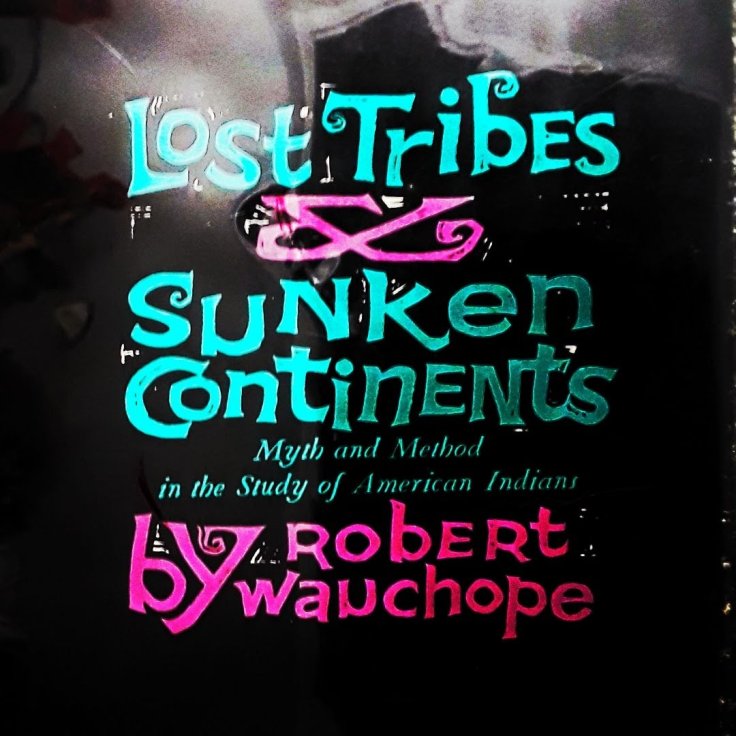
Have I mentioned I’m doing my thesis lately? I feel like maybe I haven’t…
What this really is, is an excuse for is so that I can read all these books I have piling up in more depth. I’ve put them in some order, ish, and I’ve decided to share my thoughts with you all as I go.
I started with Lost Tribes & Sunken Continents; Myth and Method in the Study of American Indians by Robert Wauchope. I’m enjoying this book as it’s written openly and conversationally. Also, the little hints of 1960’s sexism amuse me. I think the most important aspects of this book are how everything is just on a cycle of rinse, later, repeat when it comes to the fringe and pseudoarchaeology — keeping in mind that my printing of the book is from 1962 – reading the stories and issues that Wauchope shares rings a familiar bell.
In the first few chapters, Wauchope talks about lost tribes and Lost cultures. He starts with the Maya and the exciting idea that some people in the late 1800’s had that the ancient Mayans actually traveled to Europe and thereby populated it. He focuses early on Augustus Le Plongeon the French amateur archaeologist from the late 19th century. The comparisons between Le Plongeon and modern-day writers like Graham Hancock, Eric fund and again, and Scott Wolter is probably more striking than it should be. The writers above directly reflect the fervent obsession that Le Plongeon shows to his theories. Even though their writing almost 150 years between each other.
I feel like Wauchope did an excellent job of pointing out the ideas and “theories” that Le Plongeon and his cohorts held and argued over. I will say that Roberts language at times is not what we consider polite anymore. Wauchope seems to take to the idea of combating pseudoarchaeology with ridicule and humor. He does, however, mention several times the damage that pseudoarchaeology goal claims like these can have. His words nearly verbatim what modern archaeologists say today. I suppose the significant difference between Wauchope writing in the 1960s and archaeologists writing about pseudoarchaeology today is that the damage of pseudoarchaeology the Wauchope was speculating could occur, as come to pass. We, the archaeologists of the 2020s, now have to deal with most of these ideas that Wauchope brings up, being mainstream “theories” that get more air time and media exposure than real archaeology could hope for, at least here in the Americas.
It is fascinating to me to know that someone was dropping warnings about the effects of pseudoarchaeology back in the 1960s. It’s not that pseudoarchaeology didn’t exist before this point; however, it is a little disheartening to know that we were being warned and not enough people listened.
It’s also good to see how Wauchope immediately takes the pseudoarchaeology topics he tackles in his book to task over their racism. He calls out to this particular trait in the first chapter of his concise book. The reason it’s so interesting to me is that the inherent racism of pseudo-archaeological claims is a major focus of debunking efforts these days. To see that it was being addressed 60 years ago kinda tells you something. It means archaeologists recognized the wrongness of the hyper-diffusionism idea of a parent race/culture early and were sensitive to the implications of such a claim.
It’s also interesting to see Wauchope talking about Le Plongeon and other not-yet-fringe archaeologists in the same way that archaeologists today talk about our own fringe and their ideas.
I guess the best way to put it is it’s like hearing a Justin Berber remake of a Queen song, then hearing his fans accuse Queen of ripping off Justin Berber. ( and if you don’t think that happened boy do I have a story for you). It’s a little surreal seeing something that you deal with on the daily, being talked about as a clear issue 60 years before your own interactions with the topic.
My other goal in reading this book is that I’m finally starting to understand where some of these pseudoarchaeology ideas originated like in the case of Le Plongeon and his theory of Mayan and Egyptian similarities.
Interestingly enough, Le Plongeon did not suggest that Egyptians came to the Americas, but rather that Mayans made it over to Egypt, thereby making American natives the culture bearers to the Egyptians. I find that to be an interesting twist to an old story, but then have to remind myself that Le Plongeon was among one of the first to start promoting such things.
Wauchope also hits on the concepts of lost tribes, Hebrew Indians, and both the sunken continents of Atlantis and Lemuria/Mu. I know Jeb has talked about the Mu stones more than once, and I’ll link those podcast episodes down below. Wauchope, however, talks about the origins of the idea of Lemuria/Mu. The purpose of this particular islands came into being not for any supernatural reason, but because an early German biologist, Ernst Jaekel, insisted that old world monkeys must’ve evolved on a now-vanished island in the Indian Ocean because otherwise the diversity of the lemur couldn’t be explained. Ernst was unfortunately wrong, and when presented with evidence showing such, he dropped that idea.
However the island of Lemuria/Mu lived on, and though it’s not as popular as Atlantis, even today, it’s still just as mysterious.
I am only about halfway through this book because it takes forever to read anything when you’re reading it for school. I am looking forward to the future topics in the book though, especially Chapter 8 titled “The Righteous and the Racists.”
I’m looking forward to seeing how little concepts and ideas in pseudoarchaeology have changed over the past 60 years. This, despite being continuously confronted by not only skeptics but professional archaeologists and scientists too.
We’re on YouTube again!
If you’d like to support the Podcast or site, consider donating to us on Patreon or buy us a Ko-Fi. Either option helps us out.
Grab a t-shirt or coffee mug from our Swag Store on Zazzle.
Be sure to subscribe to the podcast on the blog and like and share us where ever you can.
You can follow us on twitter @ArchyFantasies, or look us up on Facebook. You can reach us by email at ArchyFantasies@gmail.com.
Contact us below or leave a comment.
Resources:
Jeb Card and the Mu Stones, AF Podcast 35
Dr. Jeb Card and the ‘Mu Stones’ – My-Mu Blog
Dr. Jeb Card and the Mu Stones – Youtube vid



Leave a Reply